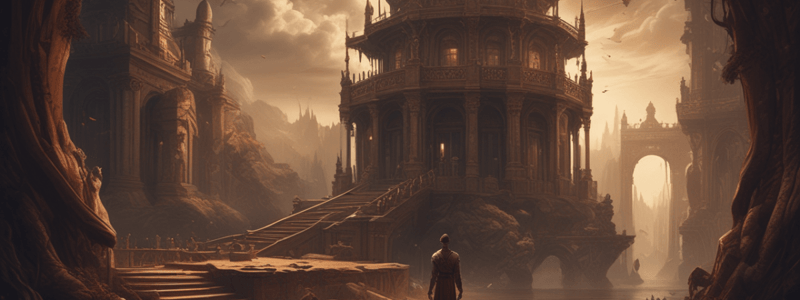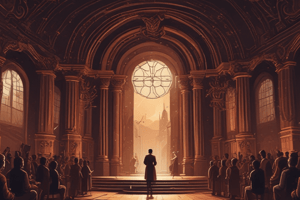Podcast
Questions and Answers
What is the term for the way a play is divided into parts?
What is the term for the way a play is divided into parts?
- Dramatic unity
- Play formation
- Theatrical format
- Dramatic structure (correct)
What is the purpose of a prologue in a drama?
What is the purpose of a prologue in a drama?
- To summarize the plot of the play
- To give a moral lesson to the audience
- To introduce the author of the play
- To provide background information about the characters and their situations (correct)
Who delivers the prologue in The Tragedy of Romeo and Juliet?
Who delivers the prologue in The Tragedy of Romeo and Juliet?
- The main character, Romeo
- A chorus, a group of actors who speak and move in unison (correct)
- The playwright, William Shakespeare
- The narrator of the play
What is the function of the chorus in The Tragedy of Romeo and Juliet?
What is the function of the chorus in The Tragedy of Romeo and Juliet?
What does the prologue in Romeo and Juliet establish?
What does the prologue in Romeo and Juliet establish?
What is true about prologues in dramas?
What is true about prologues in dramas?
What is the main purpose of dividing a play into acts and scenes?
What is the main purpose of dividing a play into acts and scenes?
What is the purpose of the background information in the opening of Romeo and Juliet?
What is the purpose of the background information in the opening of Romeo and Juliet?
How many acts can a play have?
How many acts can a play have?
What is the function of a scene in a play?
What is the function of a scene in a play?
What is an epilogue in a drama?
What is an epilogue in a drama?
What is the typical number of scenes in an act?
What is the typical number of scenes in an act?
What indicates a change in scenes?
What indicates a change in scenes?
What is the purpose of the word 'shadows' in the epilogue of A Midsummer Night's Dream?
What is the purpose of the word 'shadows' in the epilogue of A Midsummer Night's Dream?
What is the climactic moment in a play called?
What is the climactic moment in a play called?
Flashcards are hidden until you start studying
Study Notes
Dramatic Structure
- A drama or play is a story acted out on stage by actors in front of an audience.
- Dramatic structure refers to the way a play is divided into parts, similar to a book with sections and chapters.
The Prologue
- A prologue is a brief introduction to the play, providing important background information about characters and their situations.
- It can introduce main characters, describe their circumstances, or highlight themes of the play.
- The prologue is delivered by an actor or group of actors before the action of the play begins.
- Not all plays contain prologues.
Acts in a Play
- An act is a large section or division of a play.
- Plays can have any number of acts (e.g., Romeo and Juliet has five acts, A Raisin in the Sun has three acts).
- The action of the play occurs within the acts.
- Acts typically contain a character or characters with some type of conflict to resolve.
- The conflict can be internal (mental struggle) or external (struggle against others, society, or nature).
- The play's action builds towards a climax and ultimately resolves the conflict.
Scenes in a Play
- A scene is a small section of the play, a division of an act.
- Scenes are like chapters in a textbook, with each scene telling a small part of the story.
- There is no set number of scenes in an act, but typically two to three scenes per act.
- Scenes usually change when there is a change in setting or focus of the story.
- Physical transformations of the stage's setting or lighting can indicate a change in scenes.
Epilogue
- An epilogue is a short conclusion to a play that occurs after the main action has ended.
- It is similar to a post-game show, with a character addressing the audience directly.
- Epilogues were popular in Shakespeare's time, but not all plays have epilogues.
- In an epilogue, a character may beg the audience's pardon, ask for applause, and provide a final thought or message.
Studying That Suits You
Use AI to generate personalized quizzes and flashcards to suit your learning preferences.




